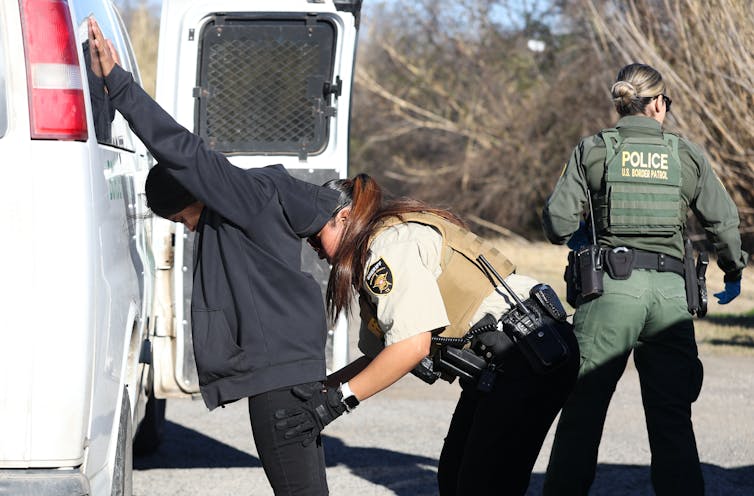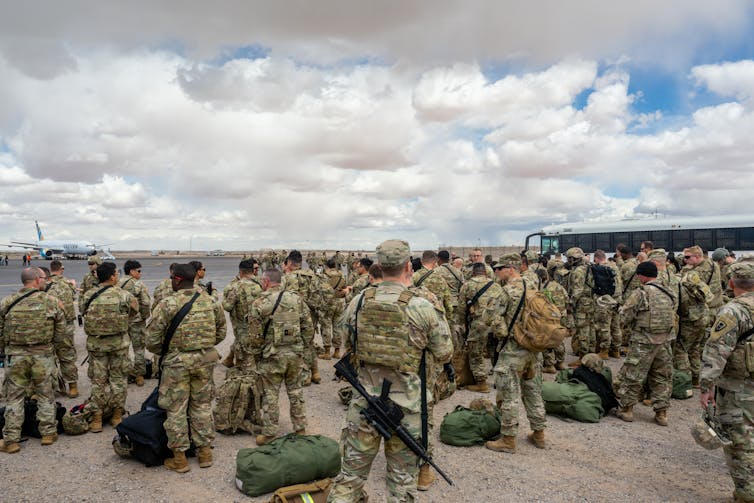For the past five years, Texas has been pushing for changes in the administration and enforcement of immigration laws. State lawmakers passed Senate Bill 4 in 2023, playing a traditional federal role by allowing Texas police to arrest people who illegally cross the border from Mexico.
But the law, while it has withstood court challenges, is not the only one that imposes traditional federal responsibilities on state governments. The Conversation's senior political editor Naomi Schalit spoke with Dan DeBree, a Texas A&M University professor, former Department of Homeland Security official and Air Force veteran, to discuss DeBree. Texas is taking other steps that could make it a key player in the implementation of immigration enforcement actions by the Trump administration.
What role do all levels of Texas government play in immigration enforcement?
Texas is at the center of a battle between federal and state entities.
Traditionally, immigration and border security have been the responsibility of federal law enforcement agencies, starting with Customs and Border Protection, which includes the Border Patrol.
Another important federal agency is Immigration and Customs Enforcement, commonly known as ICE. That part of ICE — Enforcement and Removal Operations — is responsible for conducting deportations and bringing people back to their countries of origin.
Customs and Border Protection is concentrated on the southern border. They work closely with the state of Texas and its Department of Public Safety.
Due to the nature of law enforcement, they usually work closely with them at all times. For example, in a search and rescue mission, whichever agency is closest (the local sheriff's department or the state Department of Public Safety or the federal Border Patrol) works very carefully with the nearest available assets to find a missing person.

Traditionally, the Texas Department of Public Safety has not been primarily responsible for apprehending border crossers. At the border, this is purely the purview of Customs and Border Patrol. The National Guard, whether it's the Texas National Guard or those from other states, has also long played a role in border security. The Texas National Guard is deployed throughout Texas.
But there are also National Guard troops from across the country, often deployed in small groups to take the pressure off a state, whether it's Arizona or Texas, to help them accomplish this mission. These are not federal troops. They are state troops, serving under and deployed by the governor. There are also federal forces within the joint task force that are used primarily for support purposes rather than being deployed in the field to make arrests.
Not every border state has a police function involved in border enforcement. How have things developed over the past five years?
This situation developed primarily because this was an unprecedented migration. So there are times when — both geographically and temporally — the Border Patrol is overwhelmed. They have a thin green line there - they wear green uniforms - and that's not going to stop this at all. Clearly, there are tensions between Texas governments, especially the Biden administration.
Some of these border cities are already overwhelmed. You know, I remember being at a conference and seeing a representative from El Paso talking to a representative from New York City, who was complaining about being inundated with immigrants. Detectives from the El Paso Department of Public Safety calmly laid out the numbers, which are shocking for a city of its size.
You know, in El Paso, you can say, "Hey, it's the federal government's responsibility to take care of all your needs." But if in fact that doesn't happen because it's a federal asset through no fault of its own And being crushed, then something needs to be done, right?
So this is basically a political conflict between state and federal governments over a lack of action. I do have sympathy for all border states, but especially Texas and these border areas. There is a humanitarian crisis. That's what I call it. This is a humanitarian crisis at the border caused by unprecedented global migration that really needs to be addressed.

In addition to the federal presence, state involvement includes everything from the National Guard to local police. Nearly every level of government in Texas is involved?
I have a capstone project with the Brooks County Sheriff's Department. They are overwhelmed by immigration or humanitarian crises at the border. They have many, many undiscovered remains spread across 942 square miles of desert.
With so few police officers patrolling such a large area, it will take generations to fix the problem. Then, every day, especially in the summer, they must conduct search and rescue operations for migrants in distress. Immigrants continued to flow into Brooks County. When they realize they're not going to make it, they call 911, and law enforcement at all levels is or may be involved at some point.
How do you see what Texas is doing meshing with the Trump administration's new federal immigration and border policies?
The Texas government is likely to align itself more closely with the new administration on the argument that the border has been invaded. While I personally don't like that term, I think the Trump administration is sympathetic to this argument, so I think there will be cooperation or more support or funding from federal agencies.
However, I don't think that much will change on a tactical level, such as the Brooks County Sheriff's dealings with the state Department of Public Safety and Customs and Border Patrol.
When I was at the Department of Homeland Security, I worked for the Obama administration. Then I worked for the Trump administration, and finally I worked for the Biden administration. You know, you'd think there would be sharp changes and big rudder movements, but there aren't.
The behemoth of the federal bureaucracy is difficult to move. Every government promises significant change, but often fails to deliver.
There will be executive orders on immigration at the federal level, and we're already seeing the same tools being used at the state level. I know this is part of politics. For example, Texas Governor Greg Abbott declared Mexican drug cartels or criminal organizations as terrorist organizations through an executive order. I don’t necessarily agree with this—again, definitions matter—but sometimes words are used to emphasize, even to incite. I think we'll see less of that from the state because I think the two governments will be more aligned, so there won't be a need for that.
My border security classes tend to be more emotionally evocative than almost any other class I teach. When I talk to students, I like to step back and say, "No matter how we look at this, this is a humanitarian crisis."
I don't know if this problem can be solved, but we have to find a way to mitigate it, and when we mitigate humanitarian crises, what we do is reduce human suffering. I don't think either side would agree with that, and that's how I frame it.